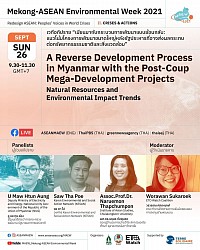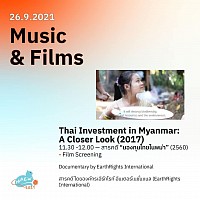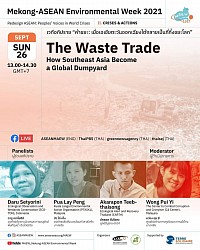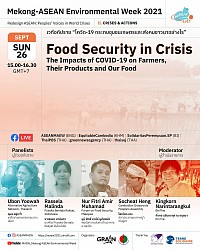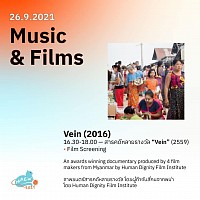26 September 2021
Panel discussion “A reverse development process in Myanmar with the post-coup mega-development projects”
26 September, 9.30-11.30 am (Bangkok time)
Organizers: Spirit in Education Movement (SEM), The Mekong Butterfly (TMB),Extra Territorial Obligation Watch Coalition (ETO Watch Coalition)
Panelists
- U Maw Htun Aung, Deputy Ministry of Electricity and Energy, National Unity Government of the Republic of the Union of Myanmar (NUG) https://youtu.be/tccJQNQcT2I
- Saw Tha Poe, Karen Environmental and Social Action Network (KESAN) https://youtu.be/zzLQXjPeudU
- Assoc. Prof. Dr. Naruemon Thapchumpon, Institute of Asian Studies, Chulalongkorn University https://youtu.be/adAID5n5MMk
Moderator
Worawan Sukaroek, ETO Watch Coalition
Watch a video of the panel
Preamble
More than seven months have passed since the Burmese military coup on February 1, 2021, to overthrow an elected government, has been condemned by the states of the international community, particularly western countries such as the European Union and the United States. He also expressed his disagreement with the coup and used divestment and investment bans to put pressure on the Myanmar military.
The outlook for foreign investment in Myanmar began to slow since February 1, when the Myanmar military seize power from the civilian government This has prompted negative feelings and created uncertainty both at home and abroad. People from Myanmar all over the country came out to protest all over the country. There was an overwhelming public criticism including the Civil Disobedience Movement: CDM, resistance to military rule is likely to continue and escalate both in cities and in ethnic state areas. Until now, the opposition to the Myanmar army has spread in all dimensions, both political and military. This could pose challenges in doing business and investing in Myanmar.
According to the United Nations High Commissioner for Human Rights (UNHCR), two military enterprise conglomerates, the Myanmar Economic Corporation (MEC) and the Union of Myanmar Economic Holding Limited (MEHL) are among the interests of the Myanmar military. The military has been an independent institution without the control or even scrutiny of the civilian government. It is also not under the state enterprise law of Myanmar. There were the generals who were elected among themselves as executives of enormous economic benefits both enterprises are related and connected with almost all sectors of businesses. It is very difficult to avoid not using the service or consuming them, such as the construction, banking, tourism, hotel, food and beverage, hospital, health and beauty, real estate, news and mass communication, distribution and transportation, forestry, energy, electricity, mining, gem, as well as oil and gas. There are more than 133 related companies.
The report found that these military enterprises were involved in violence and human rights violations against the people of Myanmar. Moreover, the income from these companies was converted into weapons of warfare for persecuting ethnic groups in different states.
If you think back on the story of Myanmar since its opening more than a decade from 2010 to 2020, Myanmar has been very open to foreign investment. There are various policy and legal tools to support such as the 20-year national economic and social development plan, the special economic zone law, Foreign Investment Law, Myanmar investment law, and so on.
After opening the country and political reform towards democracy as well as being open to foreign investment, the proportion of foreign investment has increased greatly especially from western countries.
It seems that the investment sector that generates the most wealth for the military and its networks is large-scale development projects and devastating drilling businesses like mining, especially the oil and gas business. They now have control over all state powers and turbochargers. Military affiliates reportedly dominate the domestic jade and gemstone mining market. It is also a major exporter of tens of billions of dollars of jade to China.
In addition, a report from Justice for Myanmar states that oil and gas businesses play a significant role as revenue and cash-generating wealth for the military, accounting for more than 50 percent. both the people, civil society and the National Unity Government (NUG) have urged foreign joint venture firms investing and operating in oil and gas businesses to suspend project implementation or at least suspend payments to Myanmar's state-owned enterprises like Myanmar Oil and Gas Enterprise (MOGE) to help prevent the army or the Myanmar military junta from converting this income into a tool for killing people.
These projects that are labeled with the word "development", such as dams, fossil-energy power plants, mining, road construction, and so on industrial estates, have had a wide impact on communities and the environment including the health of people in the project area and nearby Many projects have escalated into human rights violations linked to the Myanmar military's use of power. People in different areas and states are victims of political and military operations.
Although, how western nations condemn the Myanmar military's outrageous and inhumane actions in suppressing pro-democracy people, but countries that have previously invested in projects in Myanmar. And there is no clear condemnation of the military coup of Myanmar both in practice and on the world stage. Especially China and Thailand still trying to accelerate the progress of the remaining projects even more in spite of the coup and the events of armed conflict and the fight to reclaim democracy still exists. There are also other crises that have piled up, such as the COVID-19 epidemic crisis and natural disasters. This chiseled and worrisome situation is one that should be considering for Myanmar in the new era of military dictatorship. In particular, what will be the development trend and human rights situation in Myanmar from now on?
For this reason, Spirit in Education Movement (SEM) and The Mekong Butterfly intend to organize an online forum on “A reverse development process in Myanmar with the post-coup mega-development projects” to make this forum a tool and space for reflection, review and analyze the situation as well as the development of various development projects that affect human rights, community rights, and the environment since the past before the country reform until the opening of the country in a decade from 2010 to 2020, and most importantly, to analyze the situation of various development projects, especially large projects and extractive businesses, related to human rights, community rights, and the future environment that will happen under the coup for at least the next two years.
Thai Investment in Myanmar
11.30-12.00 Documentary - Thai Investment in Myanmar: A Closer Look (2017) by Earthrights International
Watch the documentary https://youtu.be/IdmpB1wD_R8
Panel discussion "The waste trade: how Southeast Asia become a global dumpyard"
26 September, 13.00-14.30 pm (Bangkok time)
Organizers: The Center to Combat Corruption and Cronyism (C4 Center) Malaysia, Ecological Alert and Recovery – Thailand (EARTH) Thailand
Panelists
- Daru Setyorini, Ecological Observation and Wetlands Conservation (ECOTON), Indonesia https://youtu.be/V-RbzCCjpyQ
- Pua Lay Peng, Kuala Langat Environmental Action Organisation (PTASKL), Malaysia
- Akarapon Teebthaisong, Ecological Alert and Recovery Thailand (EARTH)
Moderator
Watch the video of the panel
CONCEPT NOTE
The global waste trade has led to human rights violations in importing countries all over the world. Local communities, often marginalised groups, find themselves living in environments polluted by waste imported from developed countries – stockpiled, recycled, burnt, or dumped. They face health risks from toxic chemicals emitted during the materials recovery process, or greenhouse gas from fires that frequently occur, while residual waste has been found indiscriminately dumped. Activists fighting to protect the right to a safe, clean, healthy, and sustainable environment often receive threats or intimidation.
In 2018, Southeast Asia became the world’s top destinations for waste exports after China’s waste import bans, leading to a sharp rise in illegal recycling facilities as well as illegal dumpsites, causing land, water and air pollution that has affected several communities across the region. Allegations of malfeasance, misconduct, and corruption abound.
Several reports have been published about the dire impacts of the influx of wastes to Malaysia, Thailand, Indonesia, and the Philippines by Global Alliance for Incinerator Alternatives (GAIA), Greenpeace, Center to Combat Corruption and Cronyism (C4 Center), and International Pollutants Elimination Network (IPEN), Ecological Observation and Wetlands Conservation (ECOTON) and others. There are calls for a stronger ASEAN response to fight waste dumping in the region.
This panel focuses on the experiences and initiatives taken by communities affected by waste imports. Below are some questions for the panelists to consider:
1) What were the impacts of the waste trade on local communities?
a. How did the communities fight to keep their environments clean, and to keep out the imported wastes?
b. What were the challenges faced?
c. Which stakeholders did they engage?
2) Since 2018 and 2019, enforcement efforts have increased and the Basel Convention Plastic Amendments have come into force.
a. What actions have been taken by the government in each country?
b. How effective are the enforcement and monitoring efforts?
3) What is the situation now?
a. Are communities faced with different waste streams aside from plastic and paper?
b. What other wastes are entering Southeast Asia? (scrap non-ferrous metals, copper, electrical and electronic assemblies (non-hazardous), tyres)
4) What demands do local communities have for:
a. Their governments
b. ASEAN
c. Other community groups
Panel discussion Food security in crisis: the impacts of COVID – 19 on farmers, their products and our food
26 September 2021, 15-16.30 pm (Bangkok time)
Organizers:
Alternative Agriculture Network (Thailand), GRAIN, Project SEVANA South-East Asia
Panelists
- Socheat Heng, Cambodian Grassroots People's Assembly
- Nur Fitri Amir Muhamad, Malaysia Forum on Food Security, Malaysia https://youtu.be/z4ZHhjYLNTY
- Rassela Malinda, Pusaka Bentala Rakyat, Indonesia
- Ubon Yoowah, Alternative Agriculture Network, Thailand
Moderator Kingkorn Narintarangkul, BioThai
Watch the video from the panel https://youtu.be/-X7sL7HkYnw
Background
The COVID-19 outbreak is a crisis that no country can anticipate and be really prepared to deal with. In trying to slow down the outbreak and prevent the speedy infection that can cause heavy medical needs followed by public healthcare systems collapsing, most countries choose the measurement such as lockdowns or close down the city, restricting the movement of people and transportation and the social distancing. Such policies directly affected the people and their activities and indirectly impacted other relevant activities as a domino.
Concerning the agricultural system and supply chain for food, the restriction for transportation, tourism, restaurants, and hotels operation has prevented agricultural products from being sold or transported. Many countries' data collection and research results confirm that farmers who produce commercial monocultures are more severely affected than those who grow mixed crops. In terms of food security, agricultural households are more self-reliant on food than urban residents. Families with agricultural practices have turned to grow crops and raising more animals for food rather than to sell. The studies have also shown that the natural resource-bases families are more advantaged with more natural food.
Looking at economic and social dimensions, the impact of the COVID-19 epidemic has affected the economy both at the national and grassroots level. As a result, the gap of inequality has been widening. Therefore, how to survive in the present situation and deal with the future has become an important question for all sectors regarding remedy measurement, prevention of future problems, and pushing for the country’s further development.
With all this, there are important questions to answer, including; How does the Covid-19 epidemic affect the small-scale agriculture households, which is the majority of the people in Southeast Asia countries? How to adapt and build resilience in the agricultural sector? What should be the remedy approach, and what exactly is a participatory development? Also, what policies should be formed to reduce the impacts of COVID – 19 now and in the future.
Therefore, exchange and create mutual learning among representatives from different countries in Southeast Asia to look for the answers that can lead to the joint strategy and action should benefit local communities, civil society, and academia groups that are trying to work to support the agriculture/farmer movement in Southeast Asia.
